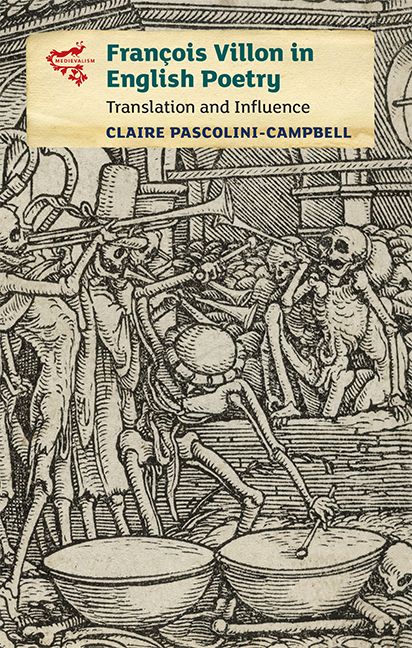Book contents
- Frontmatter
- Contents
- A Note on the Poets and the Poems
- Acknowledgements
- Introduction
- 1 Then and Now: The Legend of Villon in the Middle Ages and in Modernity
- 2 Villon and Swinburne: Finding and Singing Villon
- 3 Villon and Rossetti: Poetics of Strangeness
- 4 Villon and Pound: Modernity and the ‘Mediaeval Dream’
- 5 Villon and Bunting: Prison-Writing and Parody
- 6 Villon and Lowell: Imitation and the Visible Translator
- Conclusion
- Appendices
- Bibliography
- Index
- Medievalism
3 - Villon and Rossetti: Poetics of Strangeness
Published online by Cambridge University Press: 09 October 2019
- Frontmatter
- Contents
- A Note on the Poets and the Poems
- Acknowledgements
- Introduction
- 1 Then and Now: The Legend of Villon in the Middle Ages and in Modernity
- 2 Villon and Swinburne: Finding and Singing Villon
- 3 Villon and Rossetti: Poetics of Strangeness
- 4 Villon and Pound: Modernity and the ‘Mediaeval Dream’
- 5 Villon and Bunting: Prison-Writing and Parody
- 6 Villon and Lowell: Imitation and the Visible Translator
- Conclusion
- Appendices
- Bibliography
- Index
- Medievalism
Summary
DANTE GABRIEL ROSSETTI (b. 1828–d. 1882) is the exception amongst the Villon translators that form the focus of this book, as, despite the success of his translations, the influence of the medieval French poet on his poetics is muted. Having been adopted in part to fill an unexpected gap in the manuscript of his Poems, the presence of Villon in Rossetti's oeuvre appears as almost incidental, and he never identified with the medieval French poet to the extent that Swinburne, Pound, Bunting, and Lowell appear to have done. The Villonian persona is conspicuously absent from the poems he selects for transferral, which privilege Rossettian themes instead, such as women and sensuality, Christian iconography, ‘the medieval’, and frustrated love. However, his influence on the development of the vogue of translating Villon is irrefutable and it would not be fitting to discuss the use of the medieval French poet by Anglophone writers without including Rossetti. Indeed, not only has his phrase ‘Where are the snows of yester-year?’ achieved idiomatic status, but Rossetti's translation of the ‘Ballade des dames du temps jadis’ has prompted a number of poets to imitate that poem, their debt to their Victorian predecessor made visible in the omnipresent use of his neologism, ‘yester-year’.
This chapter will use Rossetti's translations of Villon to explore the broader theme of strangeness in his poetics, and in his method as translator in particular. For instance, that ‘yester-year’ is the result of a translation practice that approaches the postcolonial theory of ‘foreignisation’ has escaped critical notice, as has the fact that Rossetti's translations of Villon are sites of linguistic hybridity and textual strangeness. In arguing for a new reading of Rossetti's Villon as ‘strange’, the chapter will demonstrate that the several modes of strangeness that surface in his translations testify to an avant-garde, medievalising translation practice, one that perceived and promoted inter-linguistic intertextuality and defamiliarisation.
That strangeness is a feature of Rossetti's creative endeavours was suggested by his friend Ford Madox Brown, who noted the following in his diary in 1854:
On Saturday Rossetti came, in the middle of the most broiling sun. I knew he must have come to get something. He wanted costumes to paint a water-colour of the Passover, this instead of setting to work on the picture for which he has been commissioned by MacCrack since twelve months.
- Type
- Chapter
- Information
- François Villon in English PoetryTranslation and Influence, pp. 57 - 84Publisher: Boydell & BrewerPrint publication year: 2018



